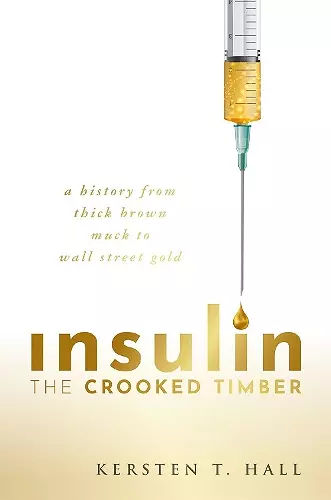Insulin - The Crooked Timber
A History from Thick Brown Muck to Wall Street Gold
Format:Hardback
Publisher:Oxford University Press
Published:20th Jan '22
Should be back in stock very soon

Before the discovery of insulin, a diagnosis of Type 1 diabetes was a death sentence. One hundred years after a milestone medical discovery, 'Insulin - The Crooked Timber' tells the story of how insulin was transformed from what one clinician called 'thick brown muck' into the very first drug to be produced using genetic engineering, one which would earn the founders of the US biotech company Genentech a small fortune. Yet when Canadian doctor Frederick Banting was told in 1923 that he had won the Nobel Prize for this life-saving discovery, he was furious. For the prize had not been awarded to him alone - but jointly with a man whom he felt had no right to this honour. The human story behind this discovery is one of ongoing political and scientific controversy. Taking the reader on a fascinating journey, starting with the discovery of insulin in the 1920s through to the present day, 'Insulin - The Crooked Timber' reveals a story of monstrous egos, toxic career rivalries, and a few unsung heroes such as two little known scientists whose work on wool fibres, carried out in a fume-filled former stable, not only proved to be crucial in unravelling the puzzle of insulin but ushered in a revolution in biology. It was the author's own shocking diagnosis with Type 1 diabetes that prompted him to sit down and write this book, but this story has lessons for us all about what technology can - and more importantly cannot - do for us. As the world pins its hopes on effective and lasting vaccines against Covid-19, these lessons from the story of insulin have never been more relevant.
[uses] a blend of profound research, lively writing and personal knowledge of diabetes * Andrew Robinson, Nature *
The lengthy bibliography and endnotes are a testament to the extensive research that has been carried out to produce this fascinating account. * Arpan K. Banerjee, Hektoen International *
The story of insulin over the past 100 years, as the historian of science (and former molecular biologist) Kersten Hall shows in this dense and fascinating book, is also a microcosm of developments in science more widely, and of changes in the politics and economics of healthcare.[...] The pleasures of this book lie mainly in the storytelling detail and the gossipy richness of the lives, friendships and feuds glimpsed in the hubbub of decades pursuing the improvement of human health. * Steven Poole, Daily Telegraph *
... comprehensive account of the modern medical history of the hormone... * Jerome Groopman, New York Review of Books *
A fascinating book by an author with excellent credentials, well written and meticulously researched. * Geoff Gill, University of Liverpool *
A timely book, pulling together many interesting stories about the scientific side of insulin. * John Pickup, King's College London School of Medicine *
Reviews the events around the discovery of insulin in an original and well-documented manner. * Pierre Lefèbvre, University of Liège *
Written in a clear and engaging style, the book provides a fresh take on historic events and also delves into aspects that have not been adequately explored previously. * Jeffrey Friedman, Rockefeller University *
It is a good read and scholarly account. * Arpan Banerjee, Hektoen International Journal *
Insulin-the Crooked Timber is essential reading for anyone concerned with the history of insulin. * Social History of Alcohol and Drugs. *
Hall's The Crooked Timber expertly combines careful attention to the science with thoughtful consideration of its historical and philosophical dimensions. * Neelanjana Ray, History and Philosophy of the Life Sciences *
I expected it to be interesting - or at least the part dealing with Dick [my father] and Archer's work. What I didn't expect was that it would be a 'page turner' from start to finish! * Mr Patrick Synge, Son of Nobel laureate Richard Synge (Chemistry 1952) *
ISBN: 9780192855381
Dimensions: 240mm x 163mm x 28mm
Weight: 946g
480 pages